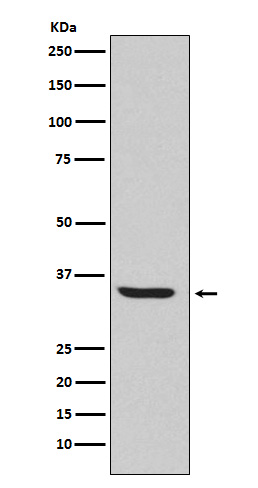
| WB | 咨询技术 | Human,Mouse,Rat |
| IF | 咨询技术 | Human,Mouse,Rat |
| IHC | 咨询技术 | Human,Mouse,Rat |
| ICC | 技术咨询 | Human,Mouse,Rat |
| FCM | 咨询技术 | Human,Mouse,Rat |
| Elisa | 咨询技术 | Human,Mouse,Rat |
| Aliases | EndoG; EndonucleaseG; Mitochondrial endonuclease G; NUCG_HUMAN;;Endo G |
| WB Predicted band size | Calculated MW: 33 kDa ; Observed MW: 30 kDa |
| Host/Isotype | Rabbit IgG |
| Antibody Type | Primary antibody |
| Storage | Store at 4°C short term. Aliquot and store at -20°C long term. Avoid freeze/thaw cycles. |
| Species Reactivity | Human,Mouse,Rat |
| Immunogen | A synthesized peptide derived from human Endo G |
| Formulation | Purified antibody in PBS with 0.05% sodium azide,0.05% BSA and 50% glycerol. |
+ +
以下是关于EndoG抗体的3篇参考文献及其摘要内容的简要概括:
---
1. **文献名称**:*Endonuclease G is an apoptotic DNase when released from mitochondria*
**作者**:Li LY, Luo X, Wang X
**摘要**:该研究揭示了EndoG在细胞凋亡过程中从线粒体释放并参与核DNA降解的机制。作者通过Western blot和免疫荧光技术,利用特异性EndoG抗体验证其在凋亡细胞中的定位及功能。
---
2. **文献名称**:*EndoG collaborates with other nucleases in apoptosis-associated DNA degradation*
**作者**:Cote J, Ruiz-Carrillo A
**摘要**:本文探讨EndoG与其他核酸酶(如CAD)在凋亡中的协同作用。研究使用EndoG抗体进行免疫共沉淀和抑制实验,证明其在DNA断裂中的关键作用,并验证抗体的特异性。
---
3. **文献名称**:*Endonuclease G regulates neurodegeneration in a Parkinson’s disease model*
**作者**:Zhang Y, Chen J, Liu H
**摘要**:该文献通过免疫组织化学和Western blot分析,利用EndoG抗体检测帕金森病模型中EndoG的表达变化,揭示其与神经元死亡的相关性,并强调抗体在组织样本中的可靠性。
---
4. **文献名称**:*Antibody validation for mitochondrial proteins: A case study of EndoG*
**作者**:Lee S, Kim DH, Park MH
**摘要**:研究评估了多种EndoG抗体的特异性,通过敲除细胞系和蛋白质印迹对比,筛选出适用于线粒体提取物分析的优质抗体,为EndoG研究提供实验工具参考。
---
以上文献均涉及EndoG抗体的实验应用(如Western blot、免疫组化、功能验证等),内容涵盖基础机制研究与疾病模型分析。
Endonuclease G (EndoG) is a conserved mitochondrial nuclease belonging to the ββα-Me finger family, encoded by the *endoG* gene in humans. Initially identified for its role in DNA repair and recombination, EndoG gained attention for its involvement in caspase-independent apoptosis. During apoptosis, EndoG translocates from mitochondria to the nucleus, where it cleaves chromosomal DNA into oligonucleosomal fragments, complementing the caspase-dependent apoptotic pathway. This dual functionality underscores its importance in maintaining genomic stability and regulating programmed cell death.
EndoG antibodies are essential tools for studying its expression, localization, and function. They enable detection of EndoG in tissues or cells via techniques like Western blotting, immunohistochemistry, and immunofluorescence. Researchers use these antibodies to explore EndoG's role in physiological processes (e.g., embryonic development, spermatogenesis) and pathological conditions, including neurodegeneration, cancer, and ischemia-reperfusion injury. Both monoclonal and polyclonal EndoG antibodies are available, with specificity validated across species (human, mouse, rat). Recent studies also investigate EndoG's non-apoptotic roles, such as mitochondrial DNA replication and inflammation regulation, expanding its therapeutic relevance. Proper antibody validation remains critical due to potential cross-reactivity with other nucleases.
×